Nurses Narratives: Sister Ellen McClelland
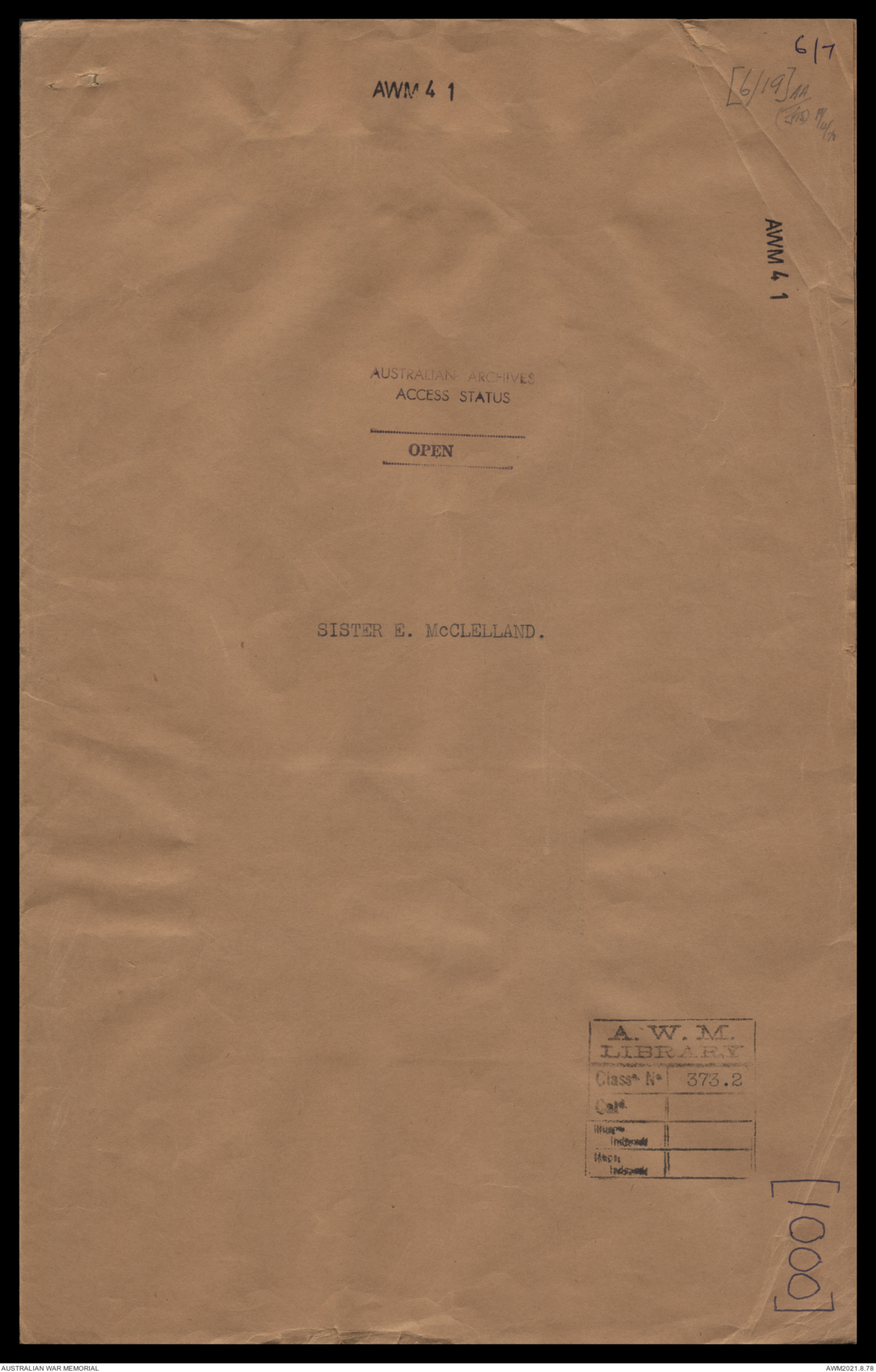
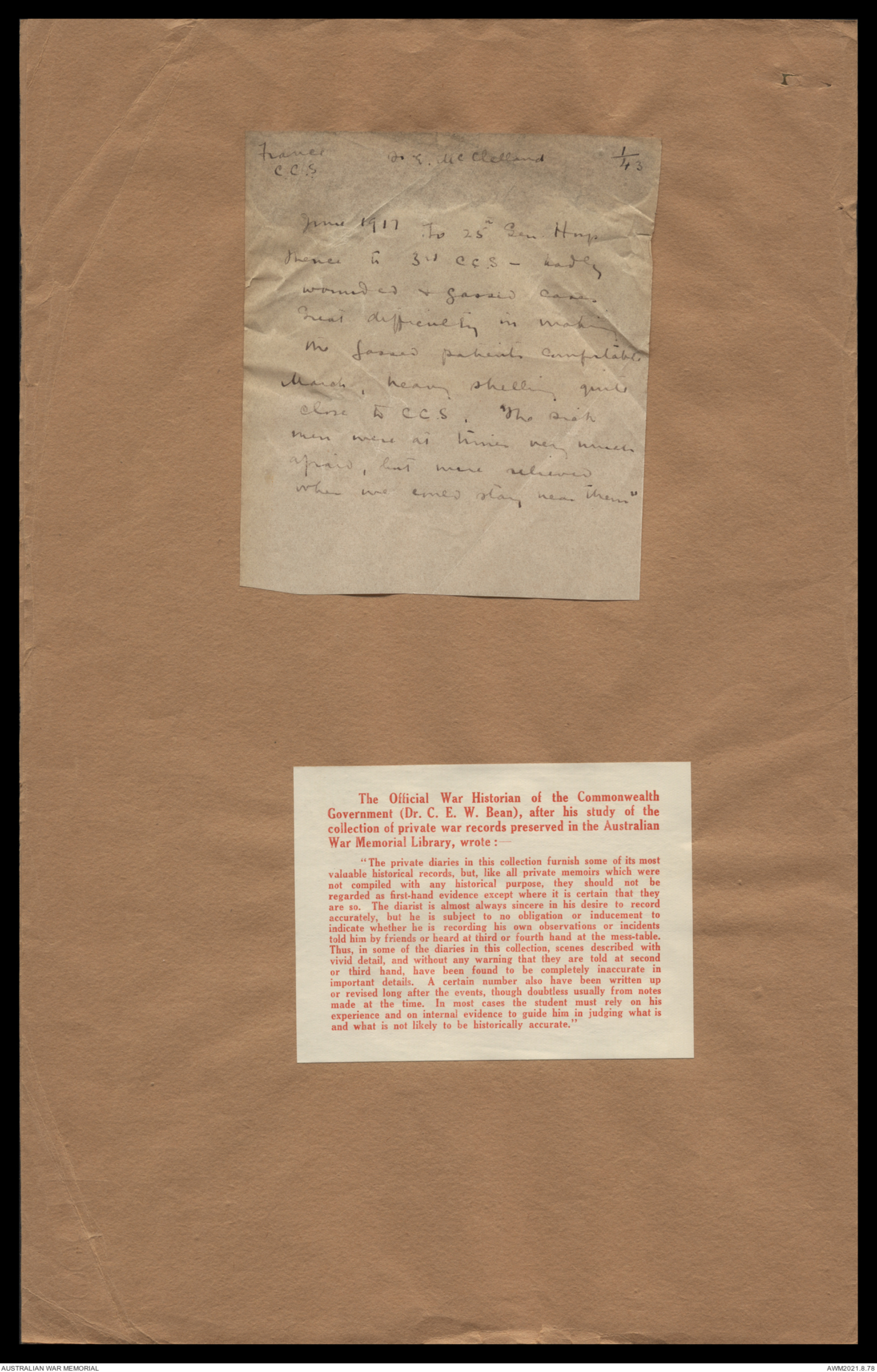
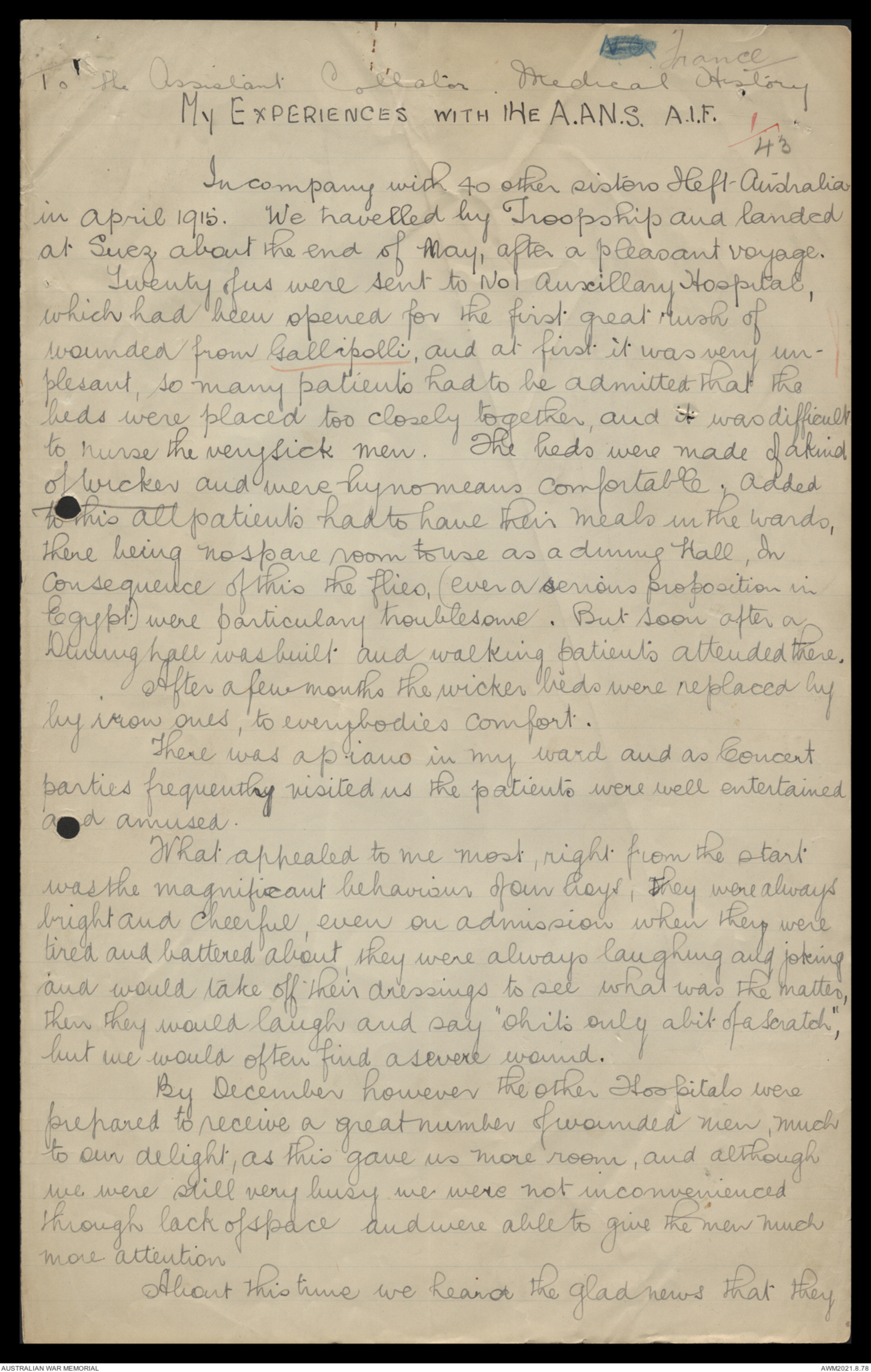
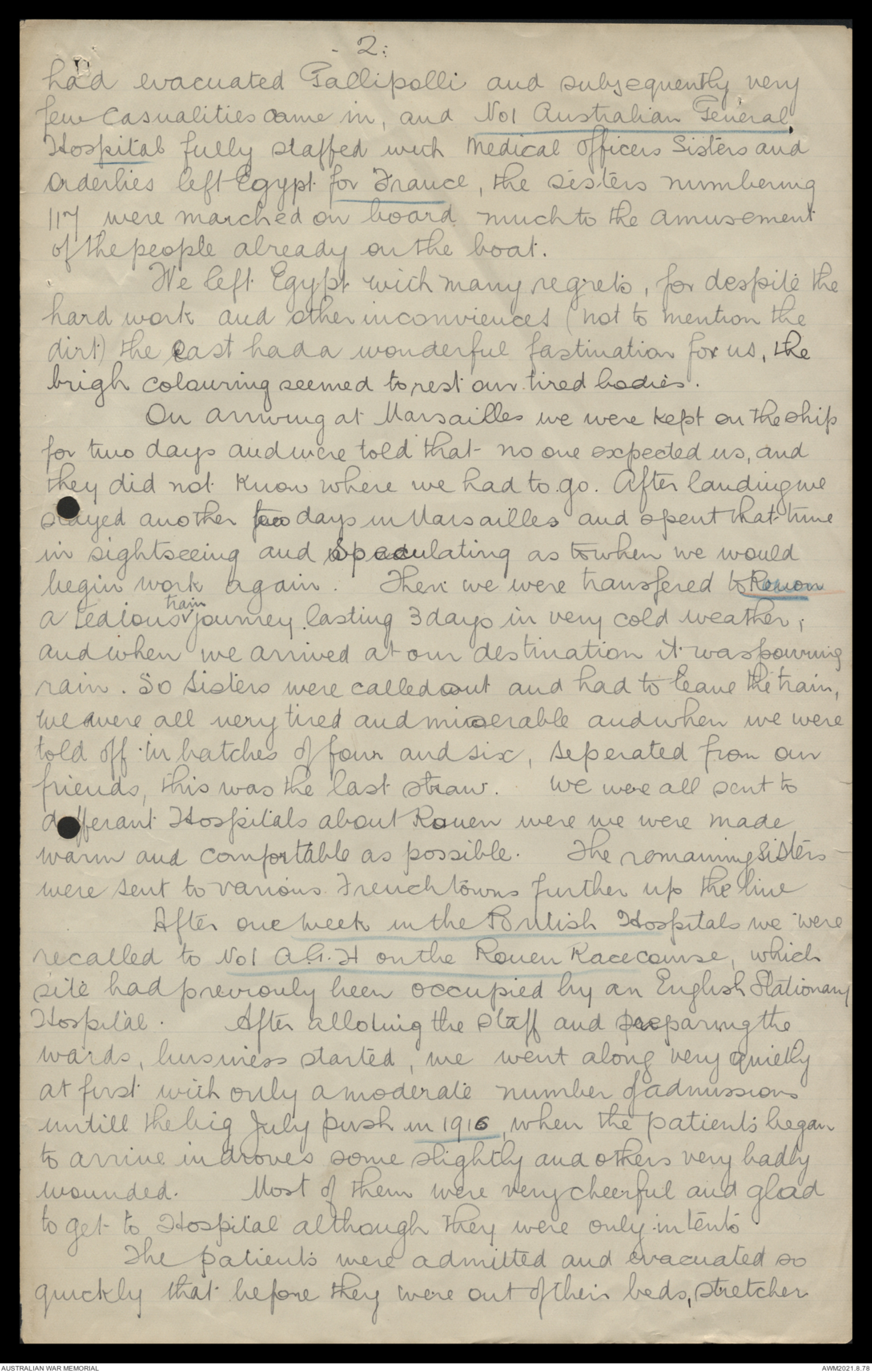
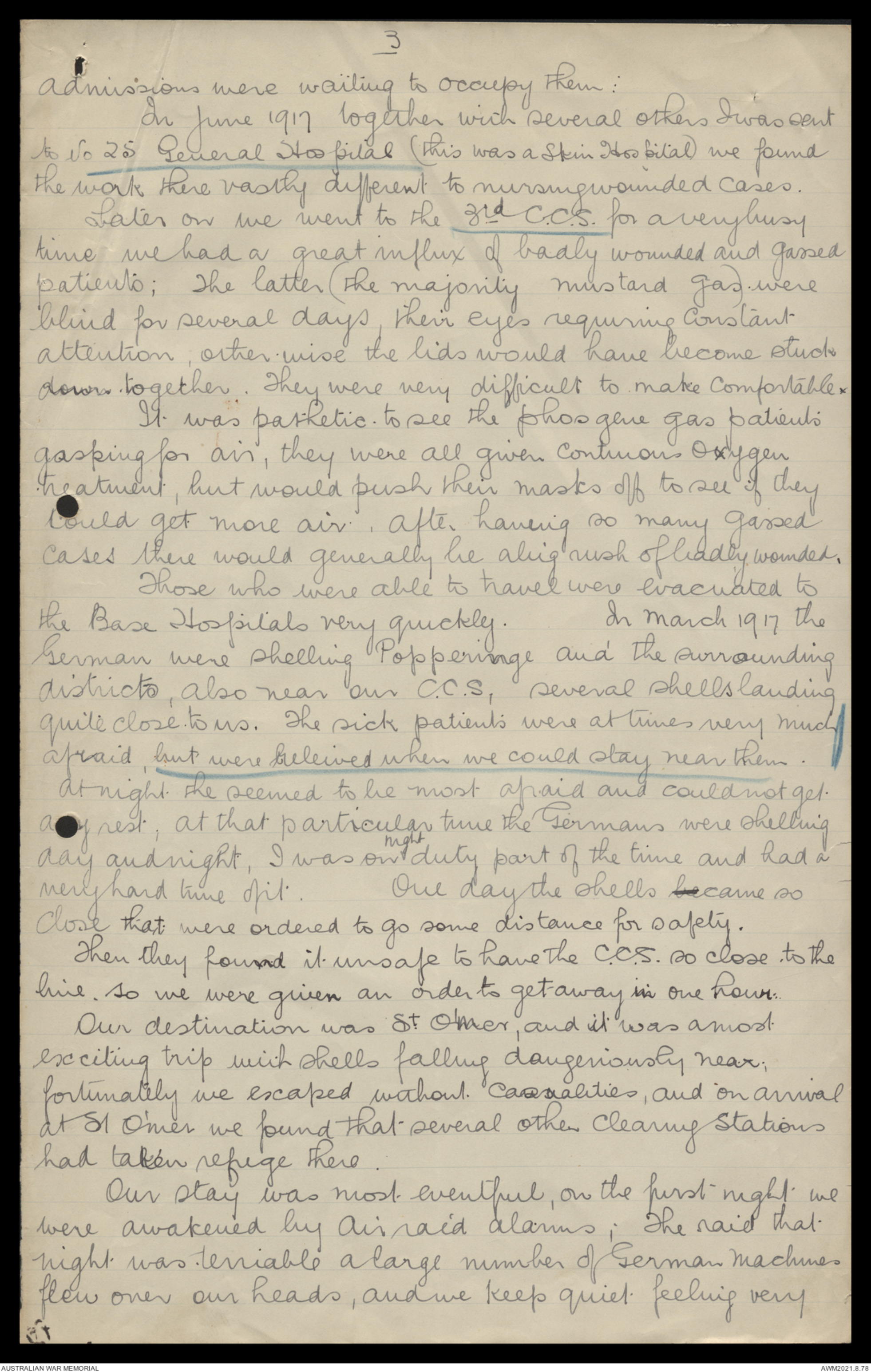
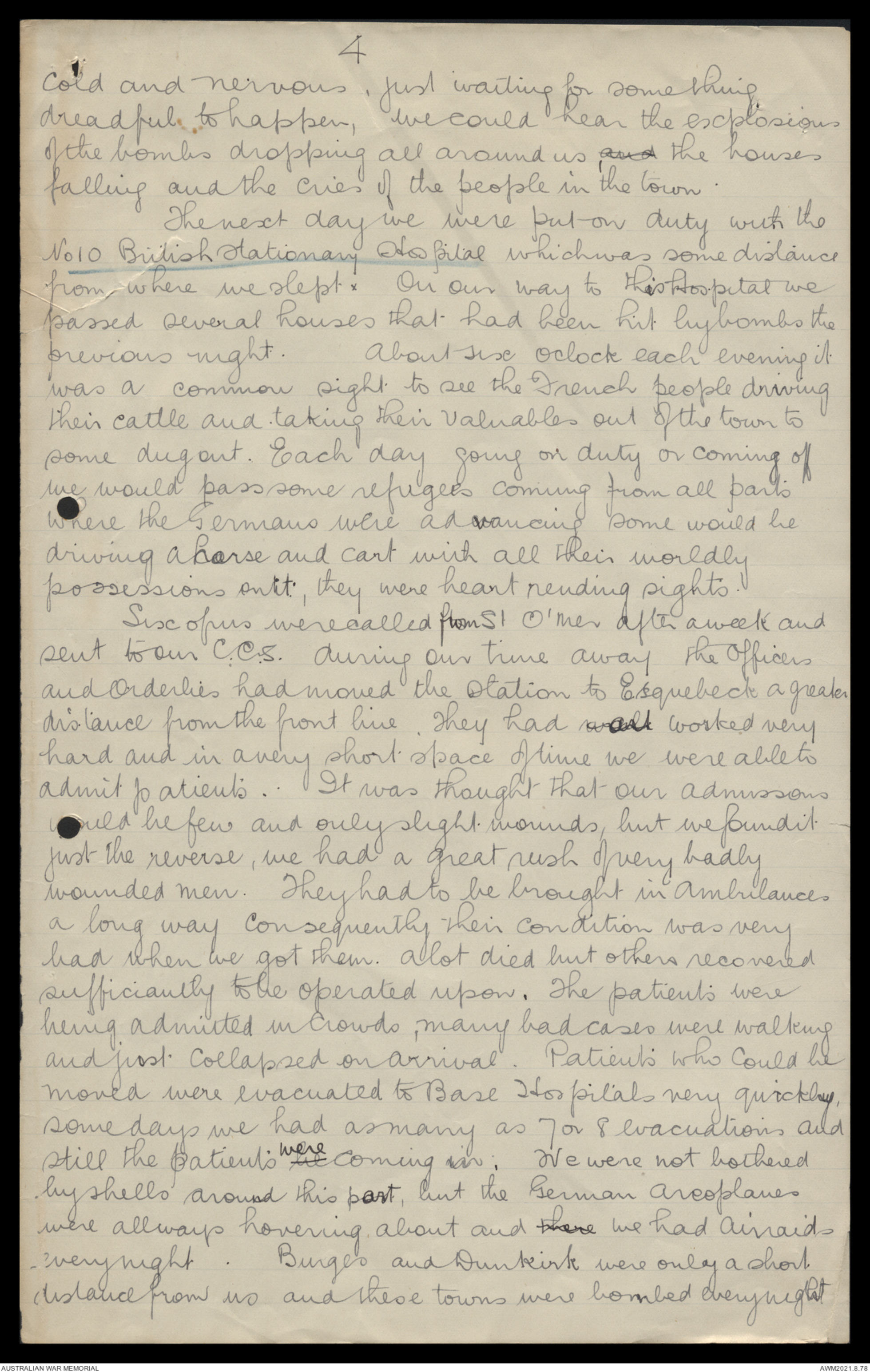
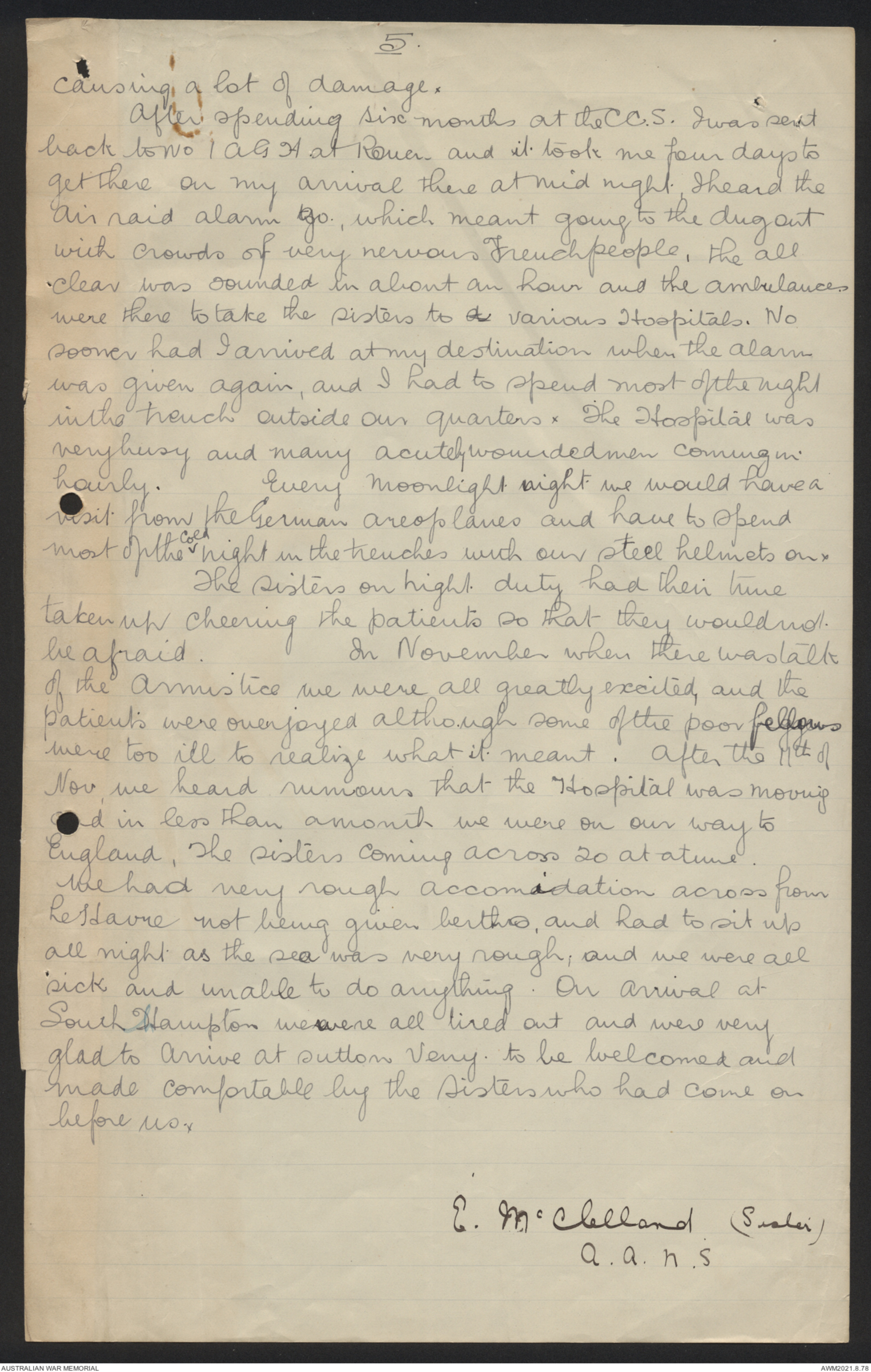
6/7
AWM 4 1
[6/19] AA
(JTS) 19/12/[[75?]]
AUSTRALIAN ARCHIVES
ACCESS STATUS
.................
OPEN
................
SISTER E. McCLELLAND.
France Sr E. McClelland 1/43
C. C. S.
June 1917 To 25th Gen Hosp thence to 3rd C.C.S. - badly wounded & gassed cases. Great difficulty in making the gassed patients comfortable. Much heavy shelling quite close to CCS. "The sick men were at times very much afraid, but were relieved when we could stay near them "
Pasted label with typed red text:
The Official War Historian of the Commonwealth
Government (Dr. C. E. W. Bean), after his study of the
collection of private war records preserved in the Australian
War Memorial Library, wrote:-
"The private diaries in this collection furnish some of its most
valuable historical records, but, like all private memoirs which were
not compiled with any historical purpose, they should not be
regarded as first-hand evidence except where it is certain that they
are so. The diarist is almost always sincere in his desire to record
accurately, but he is subject to no obligation or inducement to
indicate whether he is recording his own observations or incidents
told him by friends or heard at third or fourth hand at the mess-table.
Thus, in some of the diaries in this collection, scenes described with
vivid detail, and without any warning that they are told at second
or third hand, have been found to be completely inaccurate in
important details. A certain number also have been written up
or revised long after the events, though doubtless usually from notes
made at the time. In most cases the student must rely on his
experience and on internal evidence to guide him in judging what is
and what is not likely to be historically accurate".
France
To the Assistant Collator Medical History
MY EXPERIENCES WITH THE A.A.N.S. A.I.F.
1/43
In company with 40 other sisters I left Australia
in April 1915. We travelled by Troopship and landed
at Suez about the end of May, after a pleasant voyage.
Twenty of us were sent to No 1 Auxillary Hospital,
which had been opened for the first great rush of
wounded from Gallipolli, and at first it was very un-
plesant, so many patients had to be admitted that the
beds were placed too closely together, and it was difficult
to nurse the very sick men. The beds were made of a kind
of wicker and were by no means comfortable. Added
to this all patients had to have their meals in the wards,
there being no spare room to use as a dining Hall. In
consequence of this the flies, (ever a serious proposition in
Egypt) were particularly troublesome. But soon after a
Dining hall was built and walking patients attended there.
After a few months the wicker beds were replaced by
iron ones, to everybodies comfort.
There was a piano in my ward and as concert
parties frequently visited us the patients were well entertained
and amused.
What appealed to me most, right from the start
was the magnificant behaviour of our boys, they were always
bright and cheerful, even on admission when they were
tired and battered about, they were always laughing and joking
and would take off their dressings to see what was the matter,
then they would laugh and say "oh it's only a bit of a scratch",
but we would often find a severe wound.
By December however the other Hospitals were
prepared to receive a great number of wounded men, much
to our delight, as this gave us more room, and although
we were still very busy we were not inconvenienced
through lack of space and were able to give the men much
more attention.
About this time we heard the glad news that they
.2.
had evacuated Gallipolli and subsequently very
few casualties came in, and No 1 Australian General
Hospital fully staffed with Medical Officers Sisters and
Orderlies left Egypt for France, the sisters numbering
117 were marched on board much to the amusement
of the people already on the boat.
We left Egypt with many regrets, for despite the
hard work and other inconveniences (not to mention the
dirt) the east had a wonderful fastination for us, the
bright colouring seemed to rest our tired bodies.
On arriving at Marsailles we were kept on the ship
for two days and were told that no one expected us, and
they did not know where we had to go. After landing we
stayed another few days in Marsailles and spent that time
in sightseeing and speculating as to when we would
begin work again. Then we were transfered to Rouen
a tedious train journey lasting 3 days in very cold weather,
and when we arrived at our destination it was pouring
rain. So Sisters were called out and had to leave the train,
we were all very tired and miserable and when we were
told off in batches of four and six, seperated from our
friends, this was the last straw. We were all sent to
different Hospitals about Rouen were we were made
warm and comfortable as possible. The remaining sisters
were sent to various French towns further up the line.
After one week in the British Hospitals we were
recalled to No 1 A.G.H on the Rouen Racecourse, which
site had previously been occupied by an English Stationary
Hospital. After alloting the staff and preparing the
wards, business started, we went along very quietly a
t first with only a moderate number of admissions
untill the big July push in 1916, when the patient's began
to arrive in droves some slightly and others very badly
wounded. Most of them were very cheerful and glad
to get to Hospital although they were only in tents.
The patients were admitted and evacuated so
quickly that before they were out of their beds, stretcher
3
admissions were waiting to occupy them.
In June 1917 together with several others I was sent
to No 25 General Hospital (this was a Skin Hospital) we found
the work there vastly different to nursing wounded cases.
Later on we went to the 3rd C.C.S. for a very busy
time we had a great influx of badly wounded and gassed
patients; the latter (the majority mustard gas) were
blind for several days, their eyes requiring constant
attention, otherwise the lids would have become stuck down together. They were very difficult to make comfortable.
It was pathetic to see the phosgene gas patients
gasping for air, they were all given Continuous Oxygen
treatment, but would push their masks off to see if they
could get more air. After having so many gassed
cases there would generally be a big rush of badly wounded.
Those who were able to travel were evacuated to
the Base Hospitals very quickly. In March 1917 the
German were shelling Popperinge and the surrounding
districts, also near our C.C.S, several shells landing
quite close to us. The sick patients were at times very much
afraid, but were releived when we could stay near them.
At night the seemed to be most afraid and could not get
any rest, at that particular time the Germans were shelling
day and night, I was on night duty part of the time and had a
very hard time of it. One day the shells became so
close that were ordered to go some distance for safety.
Then they found it unsafe to have the C.C.S. so close to the
line, so we were given an order to get away in one hour.
Our destination was St. O'mer, and it was a most
exciting trip with shells falling dangerously near,
fortunately we escaped without casualties, and on arrival
at St. O'mer we found that several other Clearing Stations
had taken refuge there.
Our stay was most eventful, on the first night we
were awakened by Air raid alarms; the raid that
night was terriable a large number of German machines
flew over our heads, and we keep quiet feeling very
4
cold and nervous, just waiting for something
dreadful to happen, we could hear the explosions
of the bombs dropping all around us, and the houses
falling and the cries of the people in the town.
The next day we were put on duty with the
No 10 British Stationary Hospital which was some distance
from where we slept. On our way to this Hospital we
passed several houses that had been hit by bombs
the previous night. About six oclock each evening it
was a common sight to see the French people driving
their cattle and taking their valuables out of the town to
some dugout. Each day going on duty or coming off
we would pass some refugees coming from all parts
where the Germans were advancing some would be
driving a horse and cart with all their worldly
possessions on it, they were heart rending sights.
Six of us were called from St O'mer after a week and
sent to our C.C.S. During our time away the Officers
and Orderlies had moved the Station to Esquebeck a greater
distance from the front line. They had all worked very
hard and in a very short space of time we were able to
admit patients. It was thought that our admissions
would be few and only slight wounds, but we found
it just the reverse, we had a great rush of very badly
wounded men. They had to be brought in Ambulances
a long way Consequently their condition was very
bad when we got them. A lot died but others recovered
sufficiantly to be operated upon. The patients were
being admitted in crowds, many bad cases were walking
and just collapsed on arrival. Patients who could be
moved were evacuated to Base Hospitals very quickly,
some days we had as many as 7 or 8 evacuations and
still the patients were coming in. We were not bothered
by shells around this part, but the German areoplanes
were allways hovering about and there we had air raids
every night. Burges and Dunkirk were only a short
distance from us and these towns were bombed every night
5.
causing a lot of damage.
After spending 6 months at the C.C.S. I was sent
back to No 1 AGH at Rouen and it took me four days to
get there. On my arrival there at mid night I heard the
air raid alarm go, which meant going to the dug out
with crowds of very nervous French people, the all
clear was sounded in about an hour and the ambulances
were there to take the sisters to various hospitals. No
sooner had I arrived at my destination when the alarm
was given again, and I had to spend most of the night
in the trench outside our quarters. The Hospital was
very busy and many acutely wounded men coming
in hourly. Every moonlight night we would have a
visit from the German areoplanes and have to spend
most of the cold night in the trenches with our steel helmets on.
The sisters on night duty had their time
taken up cheering the patients so that they would not
be afraid. In November when there was talk
of the Armistice we were all greatly excited, and the
patients were overjoyed although some of the poor fellows
were too ill to realize what it meant. After the 11th of
Nov we heard rumours that the Hospital was moving a
nd in less than a month we were on our way to
England, the sisters coming across 20 at a time.
We had very rough accomidation across from
Le Havre not being given berths, and had to sit up
all night as the sea was very rough, and we were all
sick and unable to do anything. On arrival at
South Hampton we were all tired out and were very
glad to arrive at Sutton Veny, to be welcomed and
made comfortable by the Sisters who had come on before us.
E. McClelland (Sister)
A. A. N . S
 Jacqueline Kennedy
Jacqueline KennedyThis transcription item is now locked to you for editing. To release the lock either Save your changes or Cancel.
This lock will be automatically released after 60 minutes of inactivity.